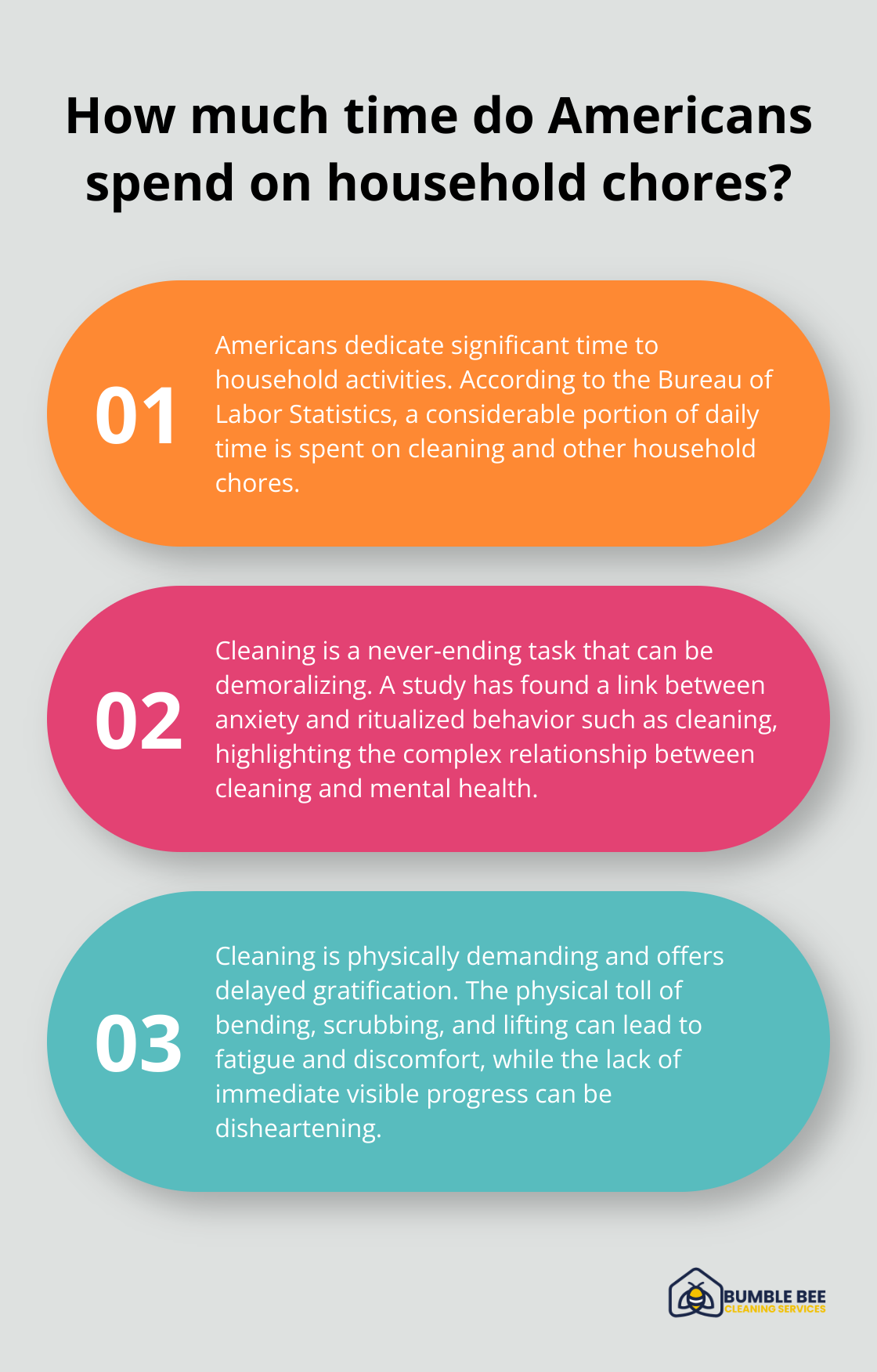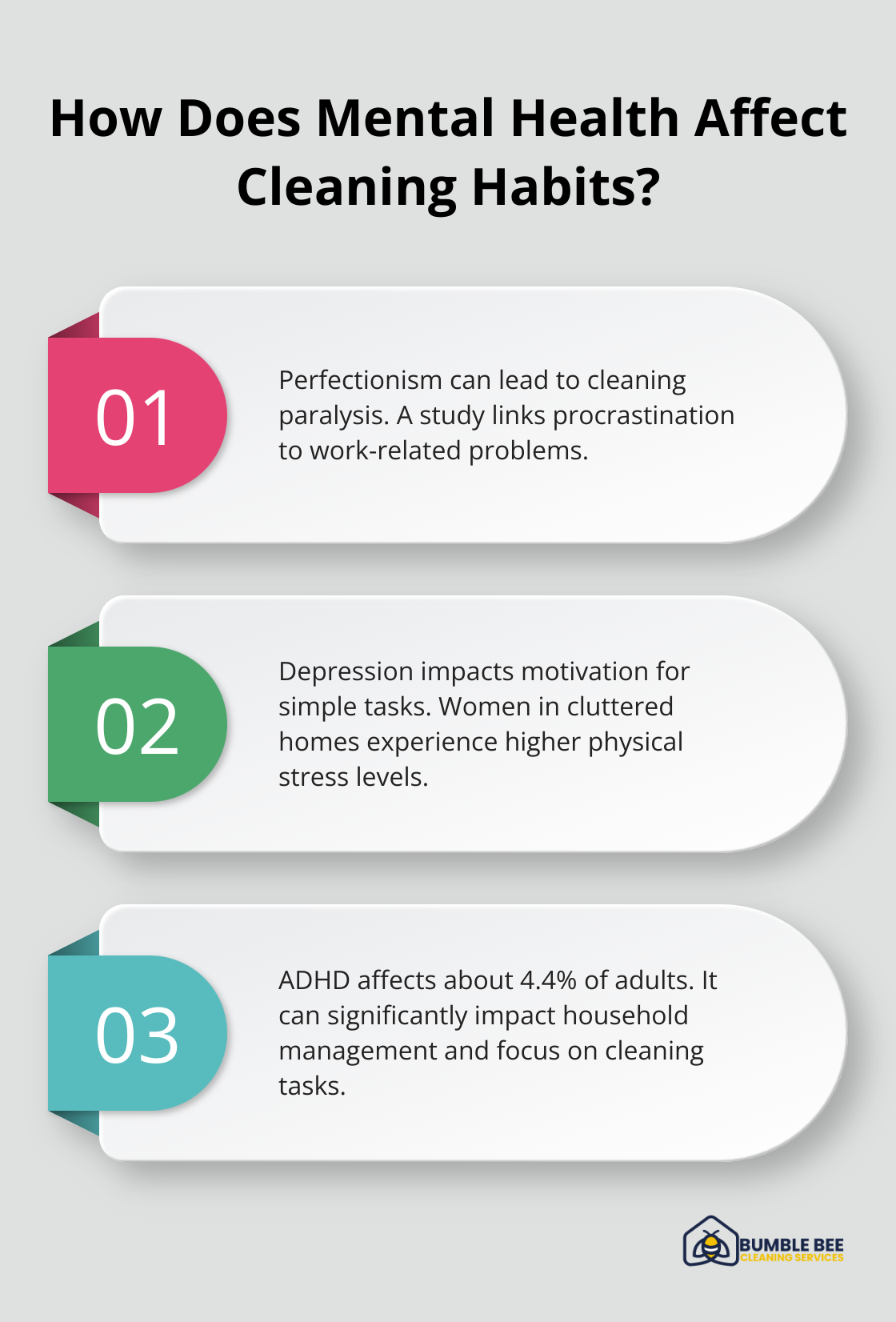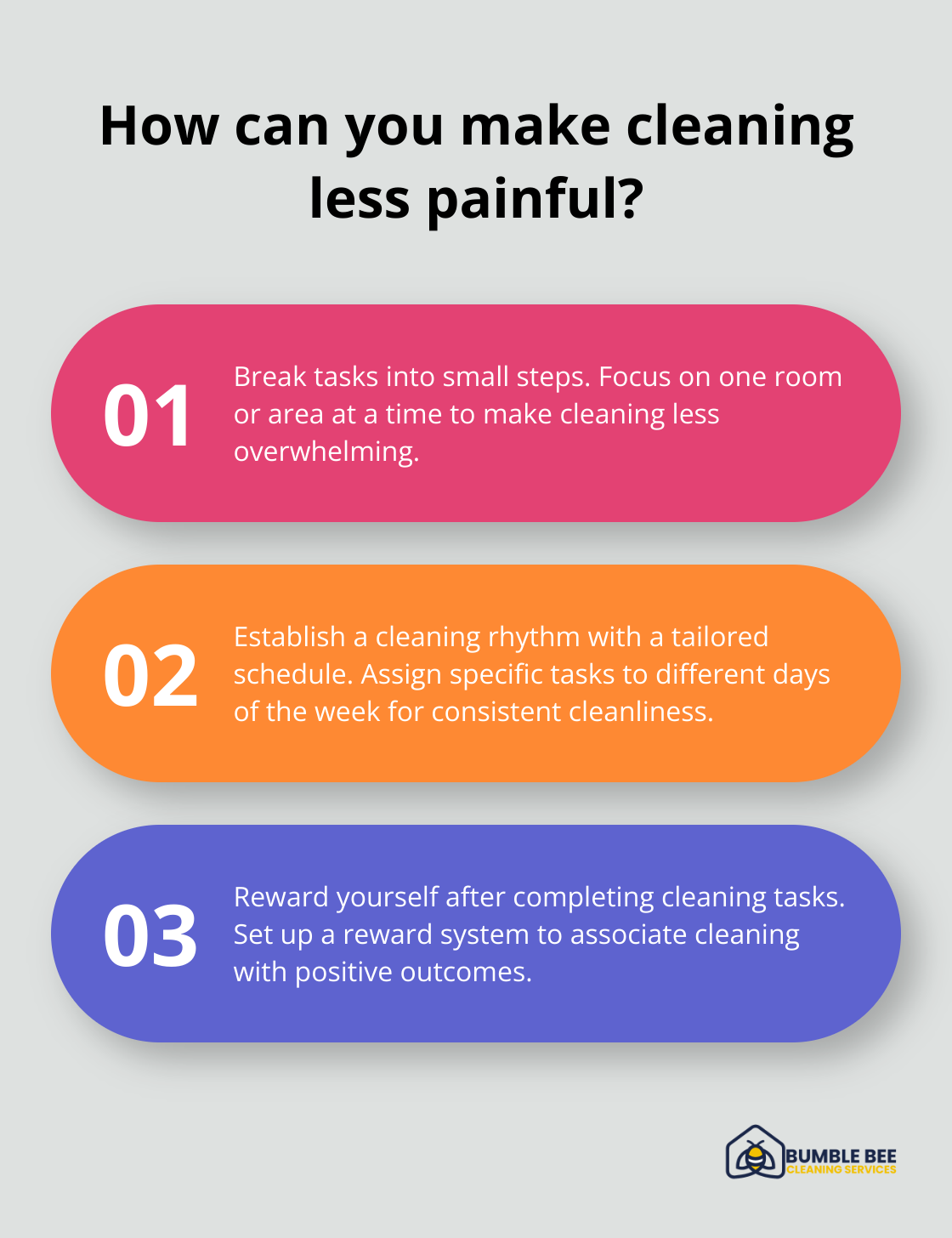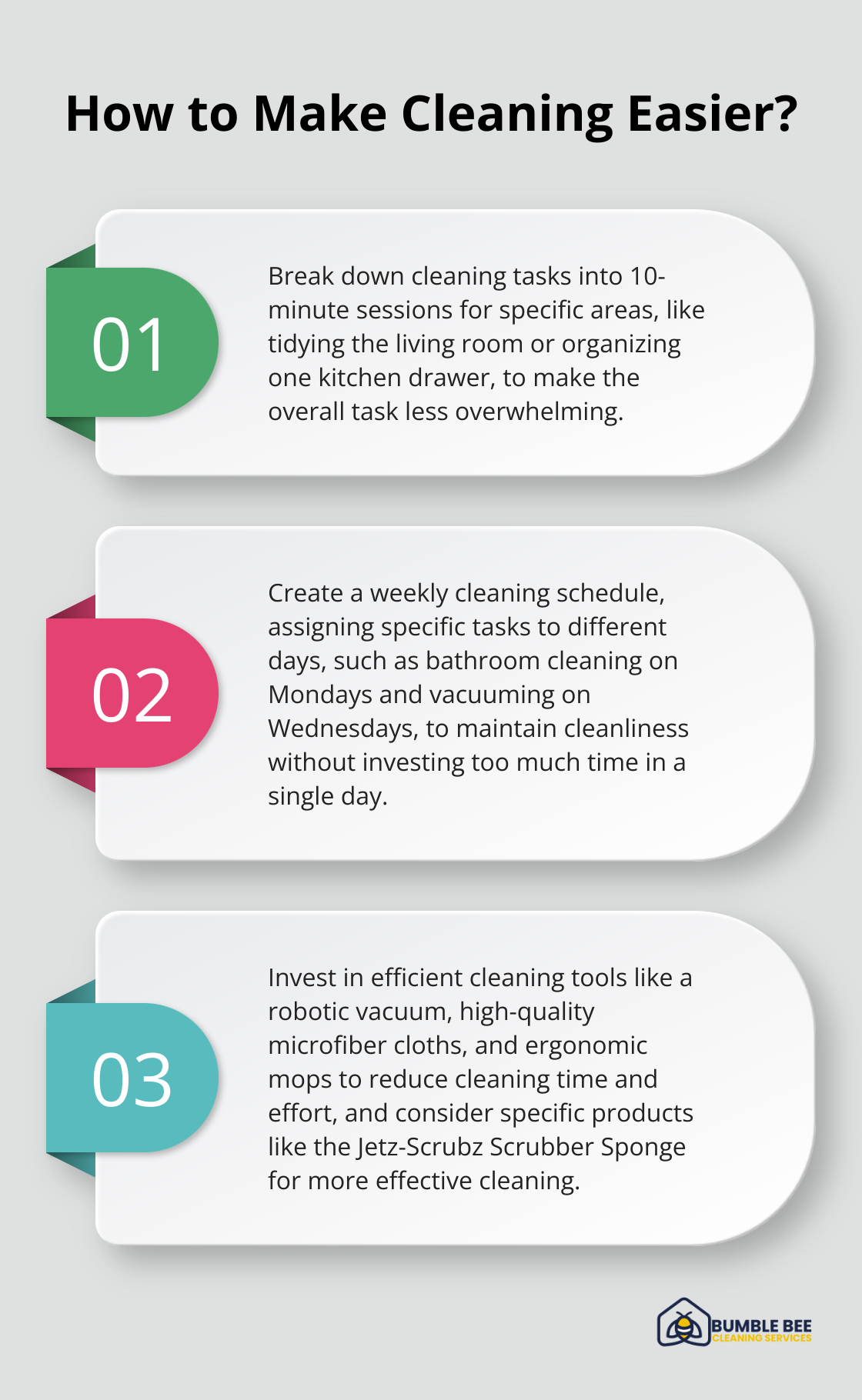Do you hate cleaning your house? You’re not alone. At Bumble Bee Cleaning Services, we often hear from people who struggle with this common aversion.
In this post, we’ll explore why so many people dislike cleaning, explore the psychological factors behind this feeling, and offer practical strategies to overcome it.
Table of Contents:
Why Cleaning Feels Like a Chore
Cleaning your house often feels like an uphill battle. Many people share their frustrations about household chores. Let’s explore why cleaning can be such a pain.
The Never-Ending Story
Cleaning is a task that never truly ends. You might spend hours scrubbing your kitchen, only to find it messy again after preparing dinner. This cycle can demoralize even the most diligent cleaners. A study emphasized a novel link between anxiety and ritualized behavior, such as cleaning, highlighting the complex relationship between cleaning and mental health.
Time is Precious
In our fast-paced world, time is a valuable commodity. According to the Bureau of Labor Statistics, Americans spend a significant amount of time on household activities, including cleaning. That’s a considerable chunk of time that could be spent on more enjoyable activities or with loved ones.
Clutter Overwhelm
Clutter can quickly accumulate, making the prospect of cleaning even more daunting. When faced with a mountain of mess, it’s easy to feel defeated before you even start.
Delayed Gratification
Unlike many tasks, cleaning doesn’t offer immediate rewards. You might spend an entire day deep cleaning your home, only to have it look almost the same as when you started. This lack of visible progress can dishearten and make the effort feel pointless.
Physical Toll
Cleaning is physically demanding work. Bending, scrubbing, and lifting can lead to fatigue and discomfort, especially for those with existing health issues.

Professional cleaning services (like those offered by Bumble Bee Cleaning Services) can alleviate these challenges. They allow you to reclaim your time and energy for the things that matter most to you. But what if hiring a cleaning service isn’t an option? In the next section, we’ll explore the psychological factors that contribute to our aversion to cleaning.
What’s Going On in Your Mind?
Psychological factors play a significant role in our aversion to cleaning. Understanding these mental barriers can help us develop effective strategies to overcome our cleaning reluctance.
The Perfectionist’s Dilemma
Perfectionism often paralyzes us when it comes to cleaning. The fear of not achieving a spotless result can prevent us from starting at all. A study published in the Journal of Obsessive-Compulsive and Related Disorders found that procrastination, which includes postponing or delaying tasks, is strongly linked to work-related problems. To combat this, set realistic goals. Start with one small area and celebrate the progress (no matter how minor it might seem).
When Motivation Takes a Nosedive
Depression and low motivation can make even simple tasks feel insurmountable. The National Institute of Mental Health reports that physical stress levels were higher for women in cluttered homes. If you experience persistent low mood and lack of motivation, it’s important to seek professional help. In the meantime, try the “five-minute rule” – commit to cleaning for just five minutes. You’ll often find the momentum to continue once you’ve started.
Attention Challenges
For those with attention deficit disorders, maintaining focus on cleaning tasks can be particularly challenging. The CDC estimates that about 4.4% of adults have ADHD, which can significantly impact household management. Break cleaning tasks into smaller, more manageable chunks to help. Use timers to create short cleaning sprints, and consider using organizational apps to keep track of tasks.
Childhood Influences
Our attitudes towards cleaning often stem from our upbringing. If cleaning associated with punishment or conflict in childhood, it’s natural to develop an aversion to it as an adult. Recognizing these learned behaviors is the first step in changing them. Create new, positive associations with cleaning by pairing it with enjoyable activities (like listening to your favorite podcast or music).

Understanding these psychological barriers is crucial, but knowing how to overcome them is equally important. In the next section, we’ll explore practical strategies to help you conquer your cleaning aversion and maintain a tidy home without mental stress.
How to Make Cleaning Less Painful
Cleaning doesn’t have to be a dreaded chore. With the right approach, you can transform it into a more manageable and even satisfying task. Here are some practical strategies to help you overcome your cleaning aversion.
Break Tasks into Small Steps
Instead of tackling your entire home at once, focus on one room or even one area within a room. This approach, known as “chunking,” can make the task feel less overwhelming. Break down cleaning tasks into smaller, manageable chunks. Create a comprehensive list of specific tasks that need to be done. Start with a 10-minute tidying session in your living room or organize one drawer in your kitchen. These small victories can boost your motivation and make the overall task seem less daunting.
Establish a Cleaning Rhythm
Create a cleaning schedule tailored to your lifestyle to help make cleaning a habit rather than a sporadic, overwhelming task. Assign specific tasks to different days of the week. For example, Monday could be for bathroom cleaning, Wednesday for vacuuming, and Friday for dusting. This approach ensures that your home stays consistently clean without requiring a massive time investment on any single day.
Upgrade Your Cleaning Arsenal
Reward Yourself
Positive reinforcement can be a powerful motivator. Set up a reward system for yourself after completing cleaning tasks. This could be as simple as enjoying your favorite snack after tidying up or treating yourself to a movie night after a deep clean. The key is to associate cleaning with positive outcomes, gradually shifting your mindset about the task.
Invest in efficient cleaning tools to significantly reduce the time and effort required for cleaning tasks. A high-quality vacuum cleaner, microfiber cloths, and ergonomic mops can make a world of difference. For instance, a robotic vacuum can keep floors tidy with minimal effort on your part. The right tools can transform the cleaning experience. Consider upgrading your tools with items like the Jetz-Scrubz Scrubber Sponge, Goodbye Detergent All Purpose Spaghetti Scrubber, or Pampered Chef Nylon Pan Scrapers for more effective cleaning.
Create a Cleaning Playlist
Music can make any task more enjoyable, and cleaning is no exception. Create a playlist of upbeat songs that energize you and make you want to move. This can turn cleaning time into a mini dance party (or at least make it feel less like a chore). You might find yourself looking forward to cleaning just to listen to your favorite tunes!

Final Thoughts
Cleaning our homes often feels like an uphill battle, leading to frustration and overwhelm. We explored common reasons behind this aversion, from time constraints to lack of immediate gratification. Psychological barriers such as perfectionism, depression, and childhood experiences contribute to our reluctance to tackle household chores.

Strategies like task-breaking, scheduling, and using efficient tools can transform our approach to cleaning. These methods make the task less daunting and help develop a more positive attitude towards maintaining living spaces. A tidy environment reduces stress, improves mental well-being, and creates a more inviting atmosphere for ourselves and guests.
For those who still hate cleaning their house, professional services offer a valuable solution. At Bumble Bee Cleaning Services, we provide comprehensive cleaning solutions (allowing you to enjoy a pristine living environment without stress). Whether you need recurring home cleaning or a deep clean, we’re here to help create a cleaner, more comfortable space.
